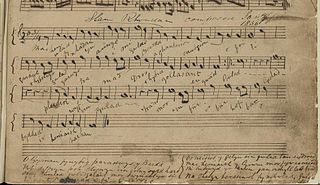
"Hen Wlad Fy Nhadau" is the unofficial national anthem of Wales. The title, taken from the first words of the song, means "Old Land of My Fathers" in Welsh, usually rendered in English as simply "Land of My Fathers". The words were written by Evan James and the tune composed by his son, James James, both residents of Pontypridd, Glamorgan, in January 1856. The earliest written copy survives and is part of the collections of the National Library of Wales.
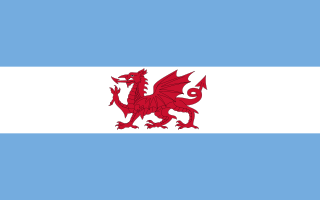
Y Wladfa, also occasionally Y Wladychfa Gymreig, refers to the establishment of settlements by Welsh immigrants in Patagonia, beginning in 1865, mainly along the coast of the lower Chubut Valley. In 1881, the area became part of the Chubut National Territory of Argentina which, in 1955, became Chubut Province.
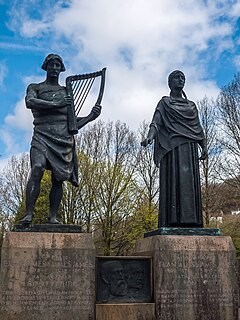
Evan James, was a weaver and poet from Pontypridd, originally from Caerphilly, Wales, who wrote the lyrics of Hen Wlad Fy Nhadau, the national anthem of Wales.

James James (1832–1902) was a harpist and musician from Hollybush, Blackwood, Wales. He composed the tune of the Welsh national anthem Hen Wlad fy Nhadau. Today, the same tune is also used for the Breton anthem, Bro Gozh ma Zadoù, and the Cornish anthem, Bro Goth agan Tasow.

The National Library of Wales, Aberystwyth, is the national legal deposit library of Wales and is one of the Welsh Government sponsored bodies. It is the biggest library in Wales, holding over 6.5 million books and periodicals, and the largest collections of archives, portraits, maps and photographic images in Wales. The Library is also home to the national collection of Welsh manuscripts, the National Screen and Sound Archive of Wales, and the most comprehensive collection of paintings and topographical prints in Wales. As the primary research library and archive in Wales and one of the largest research libraries in the United Kingdom, the National Library is a member of Research Libraries UK (RLUK) and the Consortium of European Research Libraries (CERL).

Parts of the Bible have been translated into Welsh since at least the 15th century, but the most widely used translation of the Bible into Welsh for several centuries was the 1588 translation by William Morgan, Y Beibl cyssegr-lan sef Yr Hen Destament, a'r Newydd as revised in 1620. The Beibl Cymraeg Newydd was published in 1988 and revised in 2004. Beibl.net is a translation in colloquial Welsh which was completed in 2013.

The River Aeron is a small river in Ceredigion, Wales, that flows into Cardigan Bay at Aberaeron. It is also referred to on some older maps as the River Ayron.
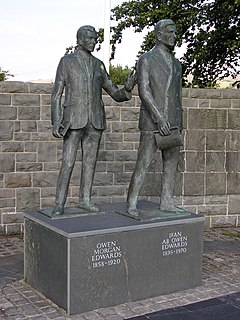
Sir Owen Morgan Edwards was a Welsh historian, educationalist and writer. He is often known as O. M. Edwards.

Gwynedd Council is the governing body for the principal area of Gwynedd, one of the subdivisions of Wales within the United Kingdom. The Council administrates internally using the Welsh language.

Wales is one of six countries to have competed in every Commonwealth Games since 1930, the others being Australia, Canada, England, New Zealand and Scotland. The Commonwealth Games is the only major sporting event where Wales takes part as a separate entity, apart from the Six Nations Rugby Championship, Rugby World Cup and international association football competitions, as in other events, such as the Olympic Games, they compete under the banner of the United Kingdom.
This article is about the particular significance of the year 1866 to Wales and its people.
This article is about the particular significance of the year 1854 to Wales and its people.

John Owen, also known by his bardic name Owain Alaw Pencerdd, was a Welsh-language poet and also a musician.

Llais Gwynedd is a small regionalist political party based in Gwynedd in North Wales. The party formed following the Plaid Cymru executive's proposal to more than halve the number of primary schools in Gwynedd by closing rural schools. Many of the party's members are former members of Plaid. The campaign was founded as Llais y Bobl, or "People's Voice", but the name was changed because there is another party by that name in Blaenau Gwent.
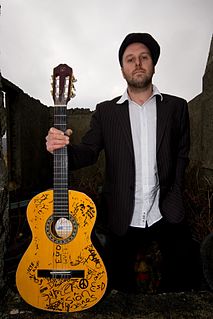
Gareth 'Gai' J Thomas 'Toms' is a Welsh singer-songwriter, musician, producer and actor. In 1992 he co-formed the popular Welsh ska-rock band Anweledig, which developed into one of Wales' top live party bands. From 1997 to 2007 he created an 'off the road' Welsh folk outfit Mim Twm Llai, releasing three albums on Recordiau Sain. Since 2008, he dropped the Mim Twm Llai pseudonym for his own lifelong nickname Gai Toms, performing solo on guitar or with his backing band. His latest album titled 'Orig', based on the life of Welsh wrestling legend Orig Williams, gave us Gai Toms a'r Banditos.

Robert Rees was a Welsh tenor and musician. He was a successful competitor at eisteddfodau for which he adopted the pseudonym Eos Morlais, and in 1867 he won the main prize as a vocalist at the National Eisteddfod of Wales. He was recognised as one of the leading Welsh soloists of his time.

Isaac Clarke was a Welsh 19th century newspaper proprietor, printer and publisher. He published the National Anthem of Wales: Hen Wlad Fy Nhadau.
Howel Davies was a Welsh Methodist minister. Little is known about his early life, but by 1737 he is known to have been a schoolmaster at Talgarth. There he was converted by Howel Harris, and on his advice went to Llanddowror to study under Griffith Jones. In 1739 he was ordained deacon, and then a priest in 1740. serving initially at the church in Llandilo Abercowin, before moving in 1741 to Llys y Fran, Pembrokeshire. Along with Harris and Jones, he made a major contribution to the spread of Calvinistic Methodism in Pembrokeshire, so much so that he became known as "the Apostle of Pembrokeshire".














